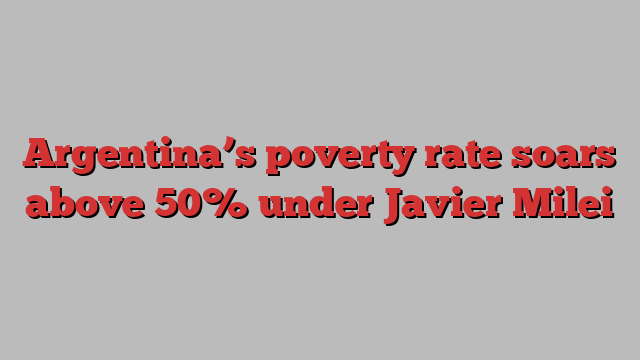
Unlock the Editor’s Digest for free
Roula Khalaf, Editor of the FT, selects her favourite stories in this weekly newsletter.
Argentina’s poverty rate has surged to 52.9 per cent under its government’s austerity programme, in a warning sign for libertarian President Javier Milei as his popularity begins to falter.
The rate, published by the national statistics agency on Thursday, is the worst in two decades and 11.2 percentage points higher than in the second half of 2023, when it stood at 41.7 per cent, meaning 3.4mn Argentines have fallen into poverty this year.
Milei, who took office in December, has slashed public spending in an effort to bring down annual inflation that peaked at close to 300 per cent in April. The price increases have eroded the purchasing power of workers and pensioners.
Economists say the root cause of the high inflation is the money printed to fund spending by previous left-leaning Peronist governments, but the removal of price controls and a devaluation of the peso under Milei have also contributed.
Milei’s spokesperson, Manuel Adorni, on Thursday claimed Argentina would have tipped into hyperinflation without the austerity programme. “They had left us on the cusp of becoming a country where practically all the residents are poor,” he said ahead of the data’s publication.
The government has struggled to pull the country out of a deep recession during a collapse in consumer spending, and a drop in industrial activity and construction because of inflation and austerity.
Opposition politicians say the cost-cutting is making the economy worse. “The government’s relentless austerity is battering working families and the elderly, deepening the crisis instead of generating solutions,” Victoria Tolosa Paz, a lawmaker for the Peronist bloc in Congress, said on X after the data was published.
Polls in recent weeks have shown Milei’s popularity ratings, which have hovered reliably around 50 per cent since his victory in last November’s election, have dipped.
A closely watched index of confidence in the government compiled by Torcuato Di Tella university fell 14.7 per cent in September, by far the biggest fluctuation this year.
The share of Argentines with a positive view of Milei dropped 7 percentage points between August and September to 40 per cent, according to pollster Poliarquía, although overall approval of his government fell only two points, to 53 per cent.
Cristian Buttié, director of pollster CB Consultora, said his numbers showed Milei’s support falling 4.2 per cent in September from August, to 46.4 per cent.
He said there was “a particularly sharp drop” among retirees, following Milei’s veto of an increase in pension spending approved by Congress in August.
At least 136,000 jobs have been wiped out since Milei took office, and experts say the losses may be greater in the country’s massive informal sector.
But official data published on Wednesday showed economic activity had grown 1.7 per cent month on month in July, compared with a 0.6 per cent increase projected by a Bloomberg analysts’ poll. Activity was down 1.3 per cent year on year, much less than analysts expected.
But Buttié cautioned the news would “only help Milei if and when the improvement becomes palpable for the average citizen”.
“For now it seems we’ve entered a recession climate, a feeling that things are worse than before. [If it wants to succeed] the government has to regain the narrative that things are moving in the right direction,” he added.